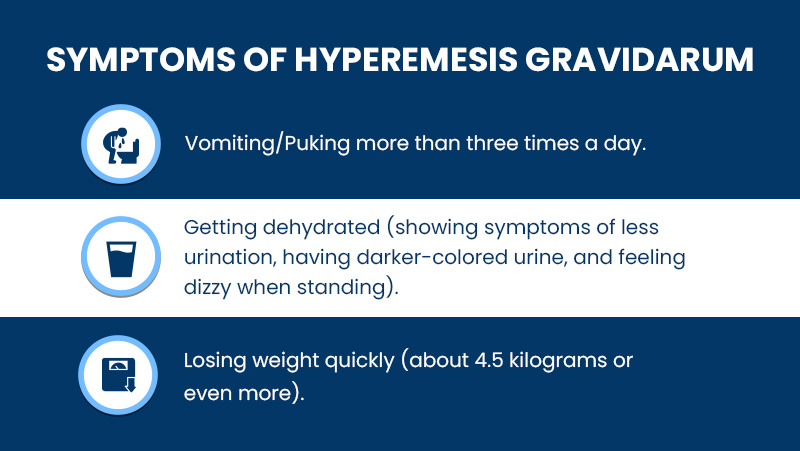During pregnancy, your body goes through a lot of different changes when creating a new life inside you. This amazing pregnancy journey of yours is filled with happiness and excitement but comes with a few challenges. One of the common problems during pregnancy is feeling nauseous, often known as "morning sickness."
Do not go by its name because it can happen at any time of the day.
Morning sickness or pregnancy nausea is not just recognized as an early pregnancy symptom but is extremely common throughout the first trimester. However, in some cases, it can continue even after that. Here's everything you need to know about morning sickness, vomiting, and nausea during pregnancy.
What is Morning Sickness or Pregnancy Nausea?
Almost every pregnant woman goes through this feeling commonly known as morning sickness, especially during the first three months of their pregnancy. According to the American Pregnancy Association, about 70% of pregnant women experience some level of morning sickness.
The symptoms include feeling like puking or nauseous. For a few expecting mothers, morning sickness starts around the fourth week of pregnancy and gets better by weeks 12 to 14. However, about every 1 in 5 women continue to feel sick into their second trimester, and a few, unfortunately, have to deal with nausea throughout their entire pregnancy.
Most of the time, morning sickness isn't harmful either for you or the baby. But if the sickness is severe, causing dehydration and weight loss, it's important to get medical help right away.
Common Causes and Symptoms of Nausea During Pregnancy
There are no such exact causes known for morning sickness during pregnancy, but healthcare experts think it's the change in hormones that leads to feeling nauseous or throwing up. It could be triggered by—
- Increase of human chorionic gonadotropin (HCG) or estrogen hormones.
- Lower level of blood sugar.
- Changes in metabolism.
- Fluctuations in blood pressure.
Morning sickness might become more intense due to—
- Feeling extremely tired.
- Stress and anxiety.
- Motion sickness.
- Eating or smelling certain foods.
- Warm weather or high temperatures.

Morning sickness may show the following symptoms that are common in almost every expecting mother—
- An upset stomach (nausea)
- Motion sickness.
- A reduced desire to eat
- A feeling of something stuck inside the throat.
- Puking
- Heartburn or reflux.
- Hunger pangs.
Risk Factors
- Feel sick when you travel.
- Pregnant with twins, triplets, or more.
- Had a history of bad morning sickness in past pregnancies.
- Overweight.
- Migraine issues.
- Dealing with a condition called trophoblastic disease, which causes the growth of abnormal cells in the uterus.
- Feeling stressed or anxious.
- Residing in hot temperatures.
- Work during the night shifts.
- Don't get enough sleep.
Nausea During Pregnancy—Is It Severe?
Yes, it is. It might surprise you, but it's true! While lots of pregnant women dealing with morning sickness feel nauseous and might throw up once or twice a day, some go through a lot tougher times where nausea lasts for hours each day, and they might vomit more than four times a day. This condition is called Hyperemesis Gravidarum.

Complications of Hyperemesis Gravidarum
If hyperemesis gravidarum is not treated, it can lead to serious complications during pregnancy as the following—
- Prenatal or postpartum depression.
- Imbalances in electrolytes.
- Impacting organs like the kidneys, liver, heart, and brain.
- Affecting the baby's growth or development.
Managing and Preventing Nausea During Pregnancy
- Try to get a good and comfortable night’s sleep. It is always advisable to get your hands on the right pregnancy pillow as it supports your body and helps sleep better.
- Do not stay empty stomach. Have something soon after you wake up.
- Avoid junk or oily foods and try to have small meals a day, as an empty stomach can trigger nausea.
- Consume prenatal vitamins prescribed by your doctor when pregnant.
- Stay away from cooking or preparing food as certain smells can trigger nausea.
- Consume as much liquid as you can. Drinking a lot of water can even help you sleep better.
- Take rest as much as you can.
When to Seek Medical Help?
- Nausea or vomiting lasts beyond your fourth month of pregnancy. This might happen to some expecting mothers. It's usually okay, but it's good to have it checked.
- Morning sickness doesn't get better, even after trying home remedies and preventive measures.
- You throw up blood that looks like coffee grounds. Seek immediate help.
- Your urine looks dark or concentrated, or you don't urinate that often.
- You puke more than three times a day, especially after eating or drinking something.
- You're drastically losing weight.
The Bottom Line
Morning sickness during pregnancy can be a difficult part of this great experience. Understanding its causes and finding ways to manage it can help expecting mothers deal with this discomfort.
Remember, each pregnancy is unique, so discovering what works best for might help. Speak to your healthcare provider if needed, and be assured that while nausea may seem challenging to you, it usually fades away with time.
Eli & Elm makes sure you get the much-needed support and comfort during this time. So grab our best quality pregnancy body pillow and get the best night's sleep— one of the most effective ways of solving all pregnancy complications.
ELI&ELM SPECIAL OFFER!
Contact Us Now!!
Sources:
Cleveland Clinic: Morning Sickness





















